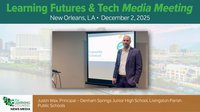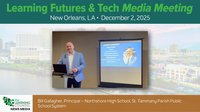Could new education funding formula cost state more than predicted? – By Frank Corder and Jeramy Pittman, Magnolia Tribune
The Mississippi Legislature appropriated an additional $240 million this year to fund changes made in the newly minted Mississippi Student Funding Formula (MSSF). As the replacement for the long-suffering MAEP education funding formula takes effect, Senate and House Education Chairmen weighed in on the potential for abuse.
The new formula creates a series of “weights” that increase the amount of funding available for low income, English language learners (ELL), special education, and Career and Technical Education (CTE) students, among other categories. The individual student weights, which did not exist under MAEP, could provide an incentive for districts to reclassify students and draw down more state funding.
Senate Education Chairman Dennis DeBar (R) said there were some concerns in his chamber over the potential for abuse ahead of MSFF’s passage. Debar said school districts will surely want to get as much money as possible.

The University of Utah just guaranteed admission to 5,000 high school seniors — before they even applied – By Courtney Tanner, Salt Lake Tribune
How can a high school student get accepted to college before even applying?
No, this isn’t a riddle — it’s part of a new pilot program the University of Utah is hoping to now expand statewide.
The first group of high school seniors who were part of the initial test of the program will receive a letter in the mail this week guaranteeing them a spot at the U. It’s called Utah Direct. And, in this inaugural round, more than 5,000 students have already secured admission before submitting an application.
They will know from day one of their senior year of high school that the U. believes they are ready for college,” said Steve Robinson, vice provost for enrollment management.
The state’s flagship institution announced the results of the first run of the program on Monday, as university leaders and K-12 officials clapped and cheered in the echoing marble lobby of the campus Park Building.

Preparing students for the world of finance – By Alex Sakariassen, Montana Free Press
For more than a decade, high school students in the eastern Hi-Line town of Saco have had to immerse themselves in lessons on debt management, budgeting and financial investing on their path to a diploma. What began as an elective course quickly morphed into a two-semester requirement for graduation, one that Saco Public Schools Superintendent Tanya Funk described as a perennial hit among students and parents alike.
“Some students are lucky enough to come from a home where the parents take time to talk to their kids about these things and teach them, but a lot of our kids don’t come from homes like that anymore,” said Funk, who taught the course herself for years prior to becoming superintendent. “So the burden has kind of shifted to the school to create responsible consumers and to create students who can go out and be productive members of society and not get themselves so deep into debt that they can never get out.”
The district’s experience teaching financial literacy offers a glimpse into the near future for public schools across Montana. Last year, Montana’s Board of Public Education approved a series of regulatory changes that includes two new statewide graduation requirements: a half-credit of civics and a half-credit of financial education or economics, both slated to go into effect next July. The move was strongly promoted by Superintendent Elsie Arntzen during her agency’s broader review of school accreditation rules, and applauded during the 2023 legislative session by lawmakers, who passed a bipartisan measure supporting financial literacy instruction.

For Microschools, ‘Location Has Been the Hardest Thing.’ Florida Made It Easier – By Greg Toppo, The 74
When Tobin Slaven and his wife Martina went searching for space for their new microschool a few years ago, they found what seemed like a perfect location: a turn-of-the-century historic home in the heart of old Fort Lauderdale, Fla., surrounded by museums, parks and a bustling downtown. And it was just a short walk from home.
They signed a lease with the local historical society for the Philemon Nathaniel Bryan House and checked with the city to ensure that a tiny alternative school could occupy the building, erected in 1905 by a son of the city’s founder. They opened Acton Academy Fort Lauderdale in February 2021 and moved in with just four students.
A month later, city officials broke the bad news: The Bryan House was actually zoned as a “learning center,” an informal space for tutoring and exhibitions — not a school. It had a sprinkler system, fire alarms and a fire escape. But if they were to stay, the historical society would have to install massive metal fire doors, among other changes.
When the historical society balked, the couple persuaded it to let them back out of their lease. The change forced them to go virtual for the rest of the school year as they searched for a new space.












